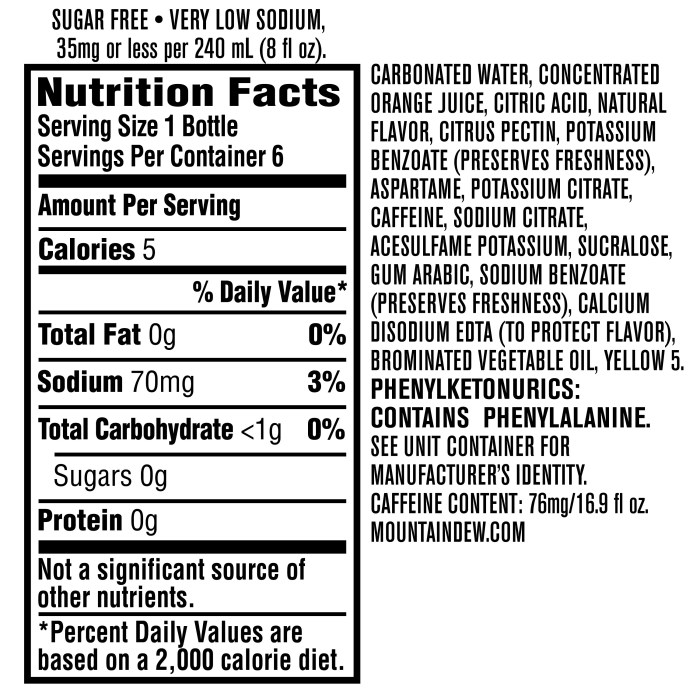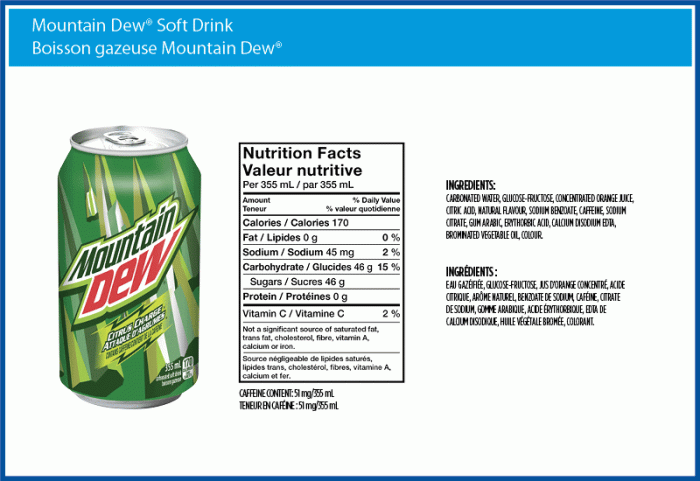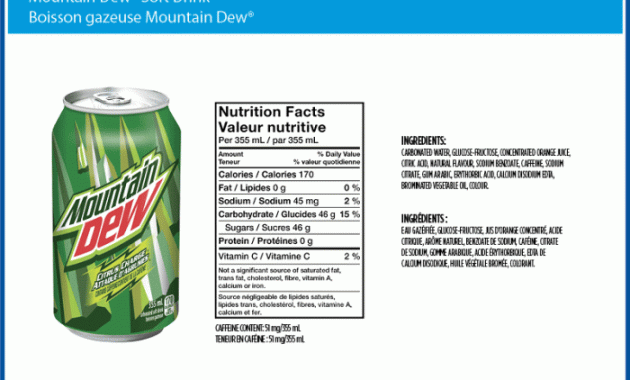Sugar Content and Health Implications: Nutrition Facts For Mtn Dew

Nutrition facts for mtn dew – Mountain Dew’s popularity stems from its distinct, intensely sweet flavor profile. However, this sweetness comes at a cost, primarily due to its remarkably high sugar content. Understanding the potential health consequences associated with this high sugar intake is crucial for informed consumption choices.The high sugar content in Mountain Dew contributes significantly to several health concerns. Excessive sugar intake is strongly linked to weight gain, as excess sugar calories are readily stored as fat.
This can lead to obesity, increasing the risk of numerous health complications, including cardiovascular disease, type 2 diabetes, and certain types of cancer. Furthermore, the high sugar concentration in Mountain Dew contributes significantly to tooth decay. The sugars feed bacteria in the mouth, producing acids that erode tooth enamel, leading to cavities and other dental problems. The acidity of the drink itself also exacerbates this issue.
Finally, consistent consumption of sugary drinks like Mountain Dew is a major risk factor for the development of type 2 diabetes. The body’s ability to regulate blood sugar levels can be overwhelmed by chronic high sugar intake, leading to insulin resistance and ultimately, type 2 diabetes.
Sugar Content Visualization
An infographic effectively communicates the significant sugar content in a single serving of Mountain Dew compared to recommended daily allowances. The infographic would feature a vibrant, eye-catching design using a contrasting color scheme. For instance, a bold, electric blue could represent Mountain Dew, while a calming green could represent healthy sugar intake recommendations. The fonts would be clean and modern, easily readable even from a distance.
Understanding the nutrition facts for Mountain Dew, a popular soda, reveals its high sugar and caffeine content. For a contrasting nutritional profile, consider checking out the details on premier protein shakes nutrition facts , which offer a different macronutrient balance. Returning to Mountain Dew, it’s crucial to be mindful of its impact on overall daily caloric intake.
A clear, sans-serif font like Arial or Helvetica would be suitable.The data visualization would employ a simple, impactful bar graph. One bar would represent the sugar content of a 20-ounce bottle of Mountain Dew (approximately 77 grams of sugar). A second, shorter bar would represent the American Heart Association’s recommended daily added sugar intake for women (25 grams) and men (36 grams).
The difference in bar lengths would dramatically illustrate the excessive sugar content in a single serving of Mountain Dew. The infographic would also include a clear title, “Mountain Dew Sugar Shock,” and concise labels for each bar, clearly stating the sugar content and source. The image would be visually striking, immediately highlighting the substantial discrepancy between the drink’s sugar content and recommended daily limits.
The overall effect would be a clear and easily understandable comparison that drives home the point of excessive sugar intake.
Reducing Sugar Intake
Individuals who regularly consume Mountain Dew can implement several strategies to gradually reduce their sugar intake. These strategies include progressively decreasing the frequency of Mountain Dew consumption, substituting it with healthier alternatives like water, unsweetened tea, or sparkling water, and gradually reducing the amount consumed per serving. Opting for diet versions, while containing artificial sweeteners, could be a transitional step, but mindful consumption is still key.
Another helpful strategy is to incorporate more fruits and vegetables into their diet, which provide natural sweetness and essential nutrients. Focusing on whole, unprocessed foods will naturally displace the need for sugary drinks. Finally, paying attention to hidden sugars in other foods and beverages is crucial for overall sugar reduction. Reading food labels carefully can help individuals make informed choices about their sugar intake.
Artificial Sweeteners and Additives

Mountain Dew, like many other sodas, contains a blend of artificial sweeteners and additives that contribute to its distinctive flavor and shelf life. Understanding the composition of these ingredients and their potential effects on health is crucial for informed consumer choices. This section will detail the artificial sweeteners and additives found in Mountain Dew, comparing their potential health impacts to those of natural sugars.
Artificial Sweeteners in Mountain Dew
While the exact formulation of Mountain Dew can vary slightly depending on region and production batch, a common artificial sweetener used is sucralose. Sucralose is a chlorinated sucrose derivative, meaning it’s chemically altered from natural sugar. It’s significantly sweeter than sucrose (table sugar) and provides minimal calories. Other artificial sweeteners may be included depending on the specific product.
Additives in Mountain Dew and Their Functions
Mountain Dew contains several additives that serve various functions in the beverage’s production and preservation. These additives can be broadly categorized by their role:
Preservatives
Preservatives extend the shelf life of the beverage by inhibiting microbial growth. Common preservatives found in Mountain Dew include sodium benzoate and potassium sorbate. These prevent the growth of bacteria, yeasts, and molds that could spoil the drink. While generally considered safe in the amounts used, some studies suggest potential health concerns with high consumption of these preservatives, although further research is needed to definitively establish a link.
Flavor Enhancers and Acidity Regulators
Mountain Dew’s distinctive citrusy flavor is achieved through a combination of natural and artificial flavorings. Citric acid is a common acidity regulator that provides the characteristic tartness. Other flavor enhancers and modifiers are also present, contributing to the overall taste profile. The specific components of these flavorings are often considered proprietary information by the manufacturer.
Coloring Agents, Nutrition facts for mtn dew
The vibrant green color of Mountain Dew is primarily due to artificial food coloring. While the exact coloring agents may vary, they are generally synthetic dyes approved for food use by regulatory bodies. These dyes contribute to the visual appeal of the beverage but have been associated with potential allergic reactions or hyperactivity in some children, although the evidence is not conclusive.
Comparison of Artificial Sweeteners and Natural Sugars
| Factor | Natural Sugars (e.g., Sucrose) | Artificial Sweeteners (e.g., Sucralose) | Health Implications |
|---|---|---|---|
| Caloric Content | High | Low to negligible | High sugar intake linked to weight gain, type 2 diabetes, and heart disease. Low-calorie sweeteners may have less impact on weight, but their long-term effects are still under investigation. |
| Glycemic Index | High | Low to negligible | High glycemic index foods cause rapid blood sugar spikes. Low glycemic index foods have a more gradual effect on blood sugar. |
| Dental Health | Can contribute to tooth decay | Generally considered less likely to cause tooth decay | Bacteria feed on sugar to produce acids that erode tooth enamel. Artificial sweeteners are less likely to be metabolized by bacteria. |
| Potential Long-Term Effects | Well-established negative effects with excessive consumption | Long-term effects are still under research and debate; some studies suggest potential impacts on gut microbiota and metabolic health | Further research is needed to fully understand the long-term health implications of artificial sweeteners. |
Commonly Asked Questions
Is MTN Dew suitable for diabetics?
Due to its high sugar content, MTN Dew is generally not recommended for individuals with diabetes. Diabetics should consult their physician before consuming this beverage.
Does MTN Dew contain any gluten?
MTN Dew is typically gluten-free, but it’s always advisable to check the ingredient list on the specific product packaging to confirm.
What are the long-term effects of drinking MTN Dew regularly?
Regular consumption of MTN Dew can contribute to weight gain, increased risk of type 2 diabetes, tooth decay, and other health problems due to its high sugar and caffeine content. Moderation is key.
Are there diet versions of MTN Dew?
Yes, several diet versions of MTN Dew exist, typically utilizing artificial sweeteners to reduce sugar content. However, these may have their own potential health implications associated with artificial sweeteners.
How much caffeine is in a 20-ounce bottle of MTN Dew?
The exact caffeine content can vary slightly, but a 20-ounce bottle of MTN Dew generally contains a significant amount of caffeine – check the nutrition label on the specific bottle for precise information.

